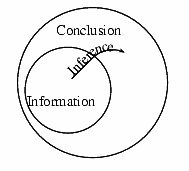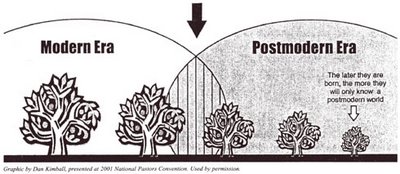
Life in the Western world is changing as we speak. It is hard for any of us to understand this because none of us have experienced a shift in culture in our lifetimes. "Every few hundred years in Western history there occurs a sharp transformation. Within a few short decades, society rearranges itself--its world view; its basic values; its social and political structure; its arts; its key institutions. Fifty years later, there is a new world. And the people born then cannot even imagine the world in which their grandparents lived and into which their parents are born. We are currently living through such a transition." -Peter Drucker,
Post-Capitalist Society.
Yes, we are in this transition. It is important for the church and Believers to understand this change or the ramifications will be huge. Postmodern culture is vastly different than modernism.
"If it makes you happy, it can't be that bad." --Sheryl Crow
"I go to synagogue, I study Hinduism...all paths lead to God." --Madonna
Whereas the modern culture stresses epistemology through science-based reason, postmodern culture understands truth and knowledge through experience. This is key in understanding postmodern culture. There is a self-determined pluralistic view of culture and religion. Why is this happening? I feel it is fairly simple to understand. There is also a shift happening from Westernization to Globalization. This is because of a communication revolution as we notice a shift from a print culture to an electronic-based, worldwide culture. There is no longer any reason why an American shouldn't know what is happening in Uganda, or Turkey. We now have access to other stories, other viewpoints, other cultures. Thus, a more pluralistic mindset is emerging because Americans are finally seeing that the rest of the world is a much different place than America, not worse or better, just different. A growing awareness that other cultures, non-European, non-Western cultures, must be met by means other than conquest or domination. Postmoderns are embracing this and it changes how they "do life".
So, the shift is on. Pluralism (relativism) is huge for postmoderns in all aspects of life. "What is good for you is good for you" is a prevailing thought for this culture. There are beautiful things about this, and some potential disasters regarding this as well. The church will have to be able to address these issues properly. Experience is big. Postmoderns don't want their brains to dictate their lives. They believe the whole core of the senses and life as it unfolds to be truth. Propositional truths are becoming obsolete. Therefore, as I concluded at the end of my modern post, I will suggest to you that as moderns tend to be governed by their brains, I believe postmoderns are governed by their senses...or dare I say, heart. More to come.





